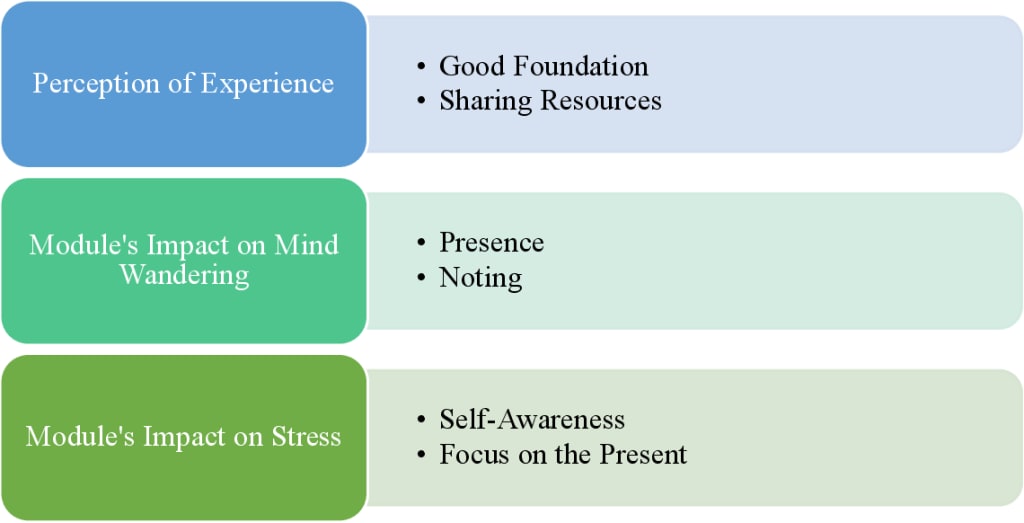"Exploring the Impact of Mindfulness"
Based Interventions on Reducing Symptoms of Anxiety and Depression.

Mindfulness, which is the practice of bringing one's attention to the present moment, has gained significant popularity in recent years as a means of reducing stress, anxiety, and depression. Although mindfulness has been practiced for thousands of years, it has only recently been embraced by Western medicine and psychology as a legitimate form of therapy. In this article, we will explore the impact of mindfulness-based interventions on reducing symptoms of anxiety and depression.
Mindfulness-Based Interventions
Mindfulness-based interventions are typically designed to teach individuals how to focus their attention on the present moment and observe their thoughts and feelings without judgment. These interventions can take many forms, including meditation, yoga, and cognitive-behavioral therapy (CBT).
Meditation-Based Mindfulness
Meditation-based mindfulness interventions involve various forms of meditation, such as focused breathing or body scan meditation. These practices encourage individuals to focus their attention on the present moment, often using a specific object of focus, such as the breath. As individuals become more skilled at meditating, they learn to observe their thoughts and emotions without getting caught up in them.
Yoga-Based Mindfulness
Yoga-based mindfulness interventions involve a series of physical postures, breath control, and meditation. Like meditation-based mindfulness, yoga encourages individuals to focus their attention on the present moment while observing their thoughts and emotions without judgment.
Cognitive-Behavioral Therapy (CBT)
Cognitive-behavioral therapy (CBT) is a form of talk therapy that has been used for decades to treat anxiety and depression. CBT-based mindfulness interventions teach individuals how to identify negative thoughts and beliefs and reframe them in a more positive way. By focusing on the present moment and practicing acceptance, individuals can learn to reduce the impact of negative thoughts and feelings on their mental health.
Impact of Mindfulness on Anxiety
Studies have shown that mindfulness-based interventions can be effective in reducing symptoms of anxiety. For example, a 2016 study published in the Journal of Clinical Psychology found that individuals with generalized anxiety disorder who participated in an eight-week mindfulness-based stress reduction program experienced significant reductions in anxiety symptoms compared to those who did not receive the intervention. The study also found that the participants who received the mindfulness intervention were less likely to experience a relapse of their anxiety symptoms six months after the program ended.
Another study published in the Journal of Anxiety Disorders in 2014 found that mindfulness-based interventions were effective in reducing symptoms of social anxiety disorder. The study found that individuals who participated in an eight-week mindfulness-based stress reduction program experienced significant reductions in anxiety symptoms compared to those who did not receive the intervention.
Impact of Mindfulness on Depression
Research has also shown that mindfulness-based interventions can be effective in reducing symptoms of depression. For example, a 2010 study published in the Archives of General Psychiatry found that individuals with a history of depression who participated in an eight-week mindfulness-based cognitive therapy program were less likely to experience a relapse of their depression symptoms compared to those who received standard care.
A 2018 study published in the Journal of Affective Disorders found that mindfulness-based cognitive therapy was effective in reducing symptoms of depression in individuals with mild to moderate depression. The study found that the participants who received the mindfulness intervention experienced significant reductions in depression symptoms compared to those who did not receive the intervention.
Conclusion
Mindfulness-based interventions have been shown to be effective in reducing symptoms of anxiety and depression. Whether through meditation, yoga, or cognitive-behavioral therapy, the practice of mindfulness can help individuals focus their attention on the present moment, reduce negative thoughts and feelings, and improve overall mental health.
About the Creator
Abdullah Javaid Khan
Im a Passionate Writer with a talent for crafting compelling stories and insightful commentary. With 2 Years Of experience in the writing industry,i have honed skills across a range of genres,from fiction to facts,journaslism to poetry.






Comments
There are no comments for this story
Be the first to respond and start the conversation.